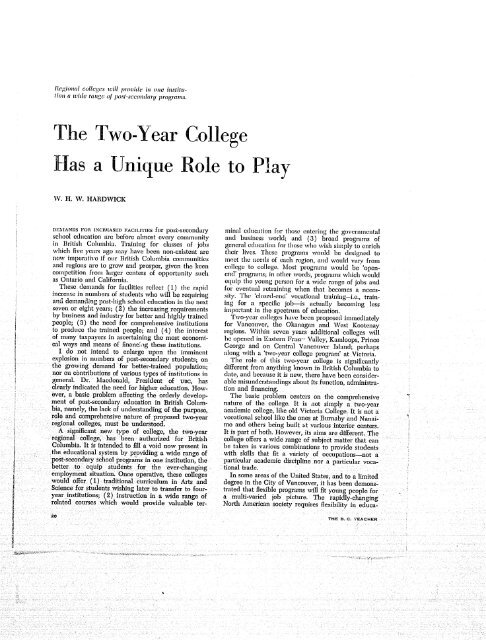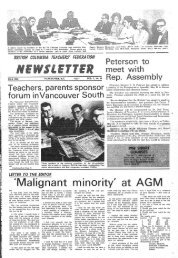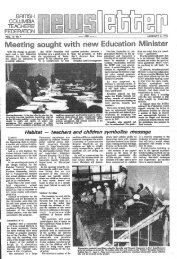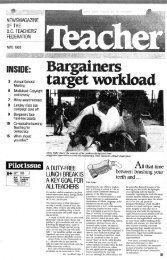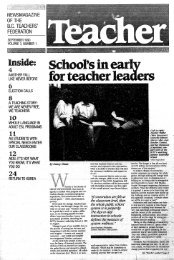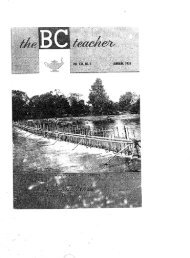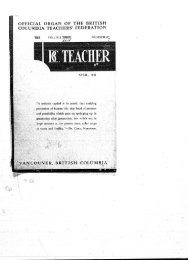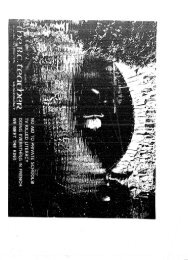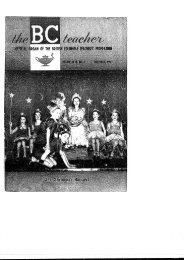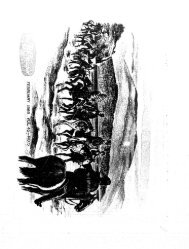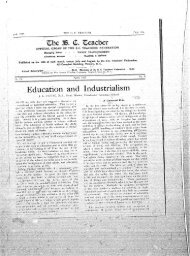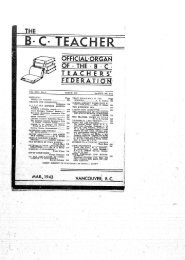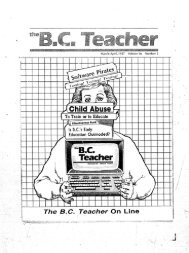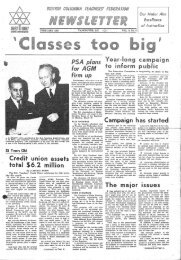Volume 44, Number 1, September/October 1964 - BCTF Home
Volume 44, Number 1, September/October 1964 - BCTF Home
Volume 44, Number 1, September/October 1964 - BCTF Home
Create successful ePaper yourself
Turn your PDF publications into a flip-book with our unique Google optimized e-Paper software.
Regional colleges will provide in one institution<br />
a wide range of post-secondary programs.<br />
The Two-Year College<br />
Has a Unique Role to Play<br />
W. H. W. IIARDWICK<br />
DEMANDS FOH INCREASED FACILITIES for pOSC-SC'COndiiry<br />
school education arc before almost every community<br />
in Hritish Columbia. Training for classes of jobs<br />
which five years ago may have been non-existent are<br />
now imperative if our British Columbia communities<br />
and regions are lo grow and prosper, given the keen<br />
competition from larger centers of opportunity such<br />
as Ontario and California.<br />
These demands for facilities reflect (1) the rapid<br />
increase in numbers of students who will be requiring<br />
and demanding post-high school education in the next<br />
seven or eight years; (2) the increasing requirements<br />
by business and industry for better and highly trained<br />
people; (3) the need for comprehensive institutions<br />
to produce the trained people; and (4) the interest<br />
of many taxpayers in ascertaining the most economical<br />
ways and means of financing these institutions.<br />
I do not intend to enlarge upon the imminent<br />
explosion in numbers of post-secondary students; on<br />
the growing demand for better-trained population;<br />
nor on contributions of various types of institutions in<br />
general. Dr. Macdonald, President of UBC, has<br />
clearly indicated the need for higher education. However,<br />
a basic problem affecting the orderly development<br />
of post-secondary education in British Columbia,<br />
namely, the lack of understanding of the purpose,<br />
role and comprehensive nature of proposed two-year<br />
regional colleges, must be understood.<br />
A significant new type of college, the two-year<br />
regional college, has been authorized for British<br />
Columbia. It is intended to fill a void now present in<br />
the educational system by providing a wide range of<br />
post-secondary school programs in one institution, the<br />
better, to equip students for the ever-changing<br />
employment situation. Once operative, these colleges<br />
would offer (1) traditional curriculum in Arts and<br />
Science for students wishing later to transfer to fouryear<br />
institutions; (2) instruction in a wide range of<br />
related courses which would provide valuable terminal<br />
education for those entering the governmental<br />
and business world; and (3) broad programs of<br />
general education for those who wish simply to enrich<br />
their lives. These programs would be designed to<br />
meet the needs of each region, and would vary from<br />
college to college. Most programs would be 'openend'<br />
programs; in other words, programs which would<br />
equip the young person for a wide range of jobs and<br />
for eventual retraining when that becomes a necessity.<br />
The 'closed-end' vocational training—i.e., training<br />
for a specific job—is actually becoming less<br />
important in the spectrum of education.<br />
Two-year colleges have been proposed immediately<br />
for Vancouver, the Okanagan and West Kootenay<br />
regions. Within seven years additional colleges will<br />
bo opened in Eastern Erase Valley, Kamloops, Prince<br />
George and on Central Vancouver Island; perhaps<br />
along with a 'two-year college program' at Victoria.<br />
The role of this two-year college is significantly<br />
different from anything known in British Columbia to<br />
date, and because it is new, there have been considerable<br />
misunderstandings about its function, administration<br />
and financing.<br />
The basic problem centers on the comprehensive<br />
nature of the college. It is not simply a two-year<br />
academic college, like old Victoria College. It is not a<br />
vocational school like the ones at Burnaby and Nanaimo<br />
and others being built &t various interior centers.<br />
It is part of both. However, its aims are different. The<br />
college offers a wide range of subject matter that can<br />
be taken in various combinations to provide students<br />
with skills that fit a variety of occupations—not a<br />
particular academic discipline nor a particular vocational<br />
trade.<br />
In some areas of the United States, and to a limited<br />
degree in the City of Vancouver, it has been demonstrated<br />
that flexible programs will fit young people for<br />
a multi-varied job picture. The rapidly-changing<br />
North American society requires flexibility in educa-<br />
THE B. C. TEACHER


